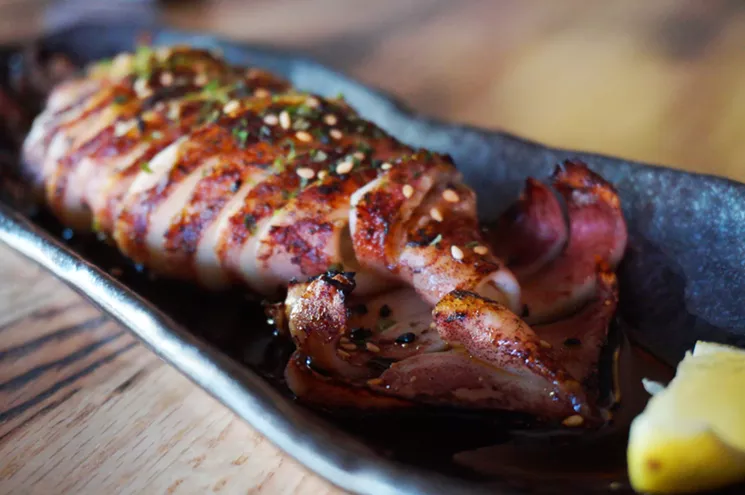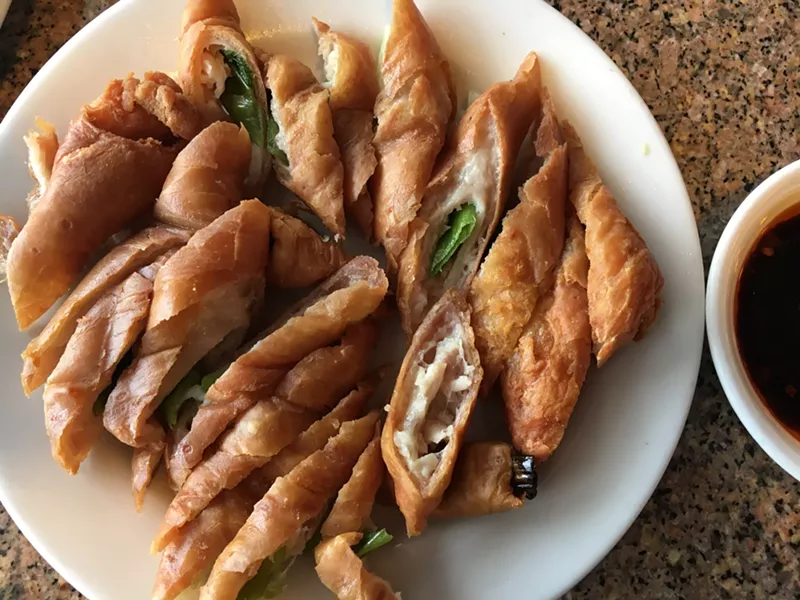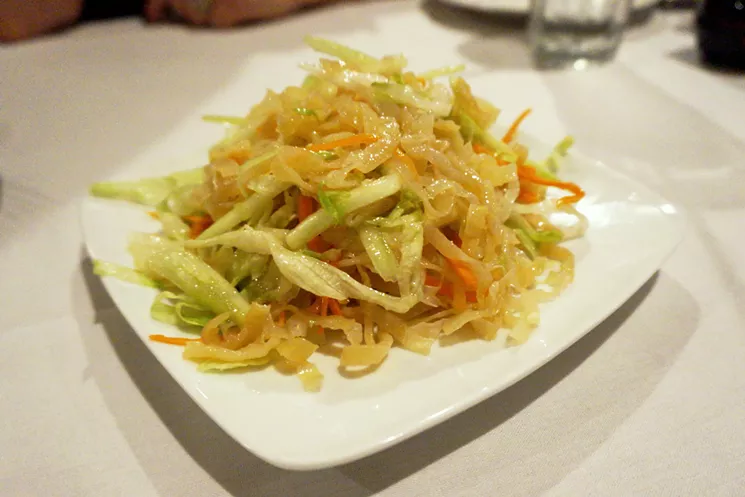“Crispy fried pork intestines — enjoy,” says the proprietor of He-Xing Garden as she backs away from the table with a genuine smile.
He-Xing Garden, which is located at 1535 South Kipling Parkway in Lakewood, isn’t a new restaurant, but it’s new to me. I’m here because a friend tipped me off to the restaurant’s northeastern (Dongbei) Chinese menu. I’ve seen similar dishes on the menus of other Chinese restaurants around Denver, but for some reason pork intestines have always been on the other side of a boundary — one that moves further and further away each time I expand the limits of what I’m willing to taste. But now I’m ready to take the plunge, and I’m nervous in the same way that I am when I visit a new doctor or board a plane for an unfamiliar destination.
On closer inspection, the rings don’t have a batter or breading at all; the crisp coating is just the outer lining of the intestine, deep-fried to a golden brown. It’s also obvious that, unlike with calamari, the intestine was fried before it was sliced. But other than what I know is the main ingredient, there’s nothing gamey or barnyard-y (to use a polite euphemism) about the dish.
In fact, the deep-fried rings are delicious, especially when dunked in a tangy, spicy black sauce.
Why had I avoided ordering pig intestines until now? We all know that the vast majority of pork sausages sold in restaurants and grocery stores have pork-intestine casings, so Americans eat intestines. Had I succumbed to subconscious cultural stereotypes — thinking that innards served in a Chinese restaurant would somehow not meet the same food standards as the same ingredient prepared by a young, hip butcher in a hip, urban butcher shop? I’d like to think that wasn’t the case, since I’ve eaten trotters, duck tongues and even jellyfish in Denver’s Chinese restaurants without feeling squeamish. Instead, I decide that my trepidation had stemmed from a fear that I wouldn’t like the dish, and if I didn’t like it, I would lose a fraction of my credibility as an adventurous eater.
But then, eating any part of a pig is not really adventurous; people have been utilizing the whole animal for millennia for reasons of economy as well as gastronomy. The pig, after all, is one of the most thoroughly edible of all domesticated animals.
I try not to judge anyone for what they choose not to eat; like a dish’s appearance, its familiarity and texture are powerful forces. We may scarf down deviled eggs by the dozen, even if the whites are a little slippery and the creamy yolks give off a sulfurous whiff, but the same texture and aroma in a Chinese preserved egg, with its greenish-black hue, prove unmanageable for many. Fortunately, at Hong Kong Barbecue, a longtime favorite at 1048 South Federal Boulevard, you can try preserved egg in relatively unintimidating rice congee; the accompanying shreds of slow-cooked duck make it even more palatable.
Our imaginations can also trigger a knee-jerk reaction to specific foods. Anyone who has seen a dead jellyfish on the beach, covered in sand and quivering like a Jell-O mold, will certainly balk at the notion of eating one. But Taiwanese jellyfish salad, as served at places like China Taipei (8100 South Quebec Street) or its Cantonese cousin King’s Land Seafood Restaurant (2200 West Alameda Avenue), is mild, inoffensive and even a little fun. Jellyfish are packed in salt and dehydrated for shipping and storage before they get to a restaurant, where they’re rinsed thoroughly and julienned for the dish. A light, tangy sauce dresses the thin, translucent tangles, which eat like al dente cellophane noodles. After my first bite of jellyfish several years ago, I now order it regularly.

Whole squid isn't quite as bar-friendly as fried calamari rings, but tastes just as good when properly cooked.
Mark Antonation
Organ meats remain a tougher sell, especially when not disguised in liver pâtés or mousses, fried up like Rocky Mountain oysters or turned into delicacies with pseudonyms like sweetbread — which doesn’t sound so sweet when you call it what it is: the thymus or pancreas of a cow. But Urban Farmer (1659 Wazee Street) turns the glands into a mouthwatering wedge of sautéed goodness, not much different in color and texture than chicken breast or pork tenderloin. My family always served giblet gravy at the Thanksgiving table, but I understand why not everyone wants diced chicken hearts, gizzards and livers floating in their beloved turkey sauce.
Still, as in other areas of life, challenging yourself to try something new isn’t a bad thing.
Just don’t pass me a plate of Swiss chard — that one’s boundary I’m not willing to cross.















